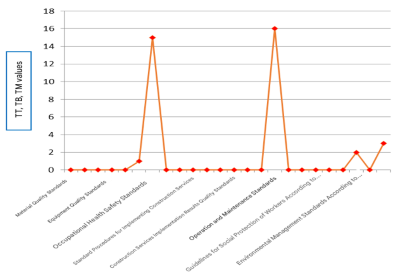Analysis of Fulfillment Security, Safety, Health, and Sustainability (K4) Standards Building Construction in Padang City
DOI:
https://doi.org/10.24036/cived.v12i1.715Keywords:
K4 Standards, Building Construction, Stakeholders, Construction Policy, Padang CityAbstract
Construction services play a crucial role in national development, and providing Safety, Health, and Sustainability (K4) standards is an important aspect in its implementation. This study aims to channel the level of provision of K4 standards in building construction in Padang City from the perspective of stakeholders (Project Owners, Supervising Consultants, and Contractors), and identify areas that need improvement. This research method uses a qualitative approach with semi-structured interview techniques. Interviews were conducted in depth with representatives from each stakeholder to explore information on the understanding, implementation, and challenges related to K4 standards. Data analysis was carried out descriptively qualitatively by identifying themes that emerged from the interviews and comparing them with the applicable K4 standards. The results of the study indicate that the level of provision of K4 standards in building construction in Padang City is not yet optimal. Of the eight criteria containing K4 standards, there are three standards that have been 100% met (material quality standards, quality standards for the results of construction service implementation, and social protection guidelines for workers). However, there are five standards that still need to be improved, namely equipment quality standards (87.50%), occupational health and safety standards (84.37%), construction service implementation procedure standards (97.22%), operational and maintenance standards (66.67%), and environmental management standards (91.20%). The novelty of this study lies in its focus on the stakeholder perspective in evaluating K4 standards. Previous studies tend to view K4 standards from only one perspective, so this study provides a more comprehensive picture. In addition, this study also specifically identifies areas that need to be improved, so that they can be the basis for implementing more effective construction policies. The practical implications of this study are recommendations for more comprehensive construction policies to improve the provision of K4 standards. Local governments and construction associations can use the results of this study to develop more effective training, socialization, and supervision programs. In addition, this study can also be a reference for construction actors to increase awareness and compliance with K4 standards.
Downloads
References
Peraturan Pemerintah (PP) No. 14 Tahun 2021, Tentang Perubahan Atas Peraturan No. 22 Tahun 2020 Tentang Peraturan Pelaksanaan Undang-undang No. 2 Tahun 2017 Tentang Jasa Konstruksi, 2021.
Surat Edaran Menteri Pekerjaan Umum Dan Perumahan Rakyat No. 10 Tahun 2022, Tentang Panduan Operasional Tertib Penyelenggaraan Kesehatan Konstruksi, 2022.
Peraturan Menteri Pekerjaan Umum dan Perumahan Rakyat No. 9 Tahun 2021, Pedoman Penyelenggaraan Konstruksi Berkelanjutan, 2021.
Undang - Undang No. 11 Tahun 2020, Tentang Cipta Karya., 2020.
Peraturan Mentri Pekerjaan Umum dan Perumahan Rakyat No. 1 Tahun 2023, Tentang Pedoman Pengawasan Penyelenggaraan Jasa Konstruksi Yang Dilaksanakan Pemerintahan Derah Provinsi, Kabupaten dan Kota., 2023.
H. Enisa, "Analisis Pengendalian Mutu Pada Proyek Pembangunan Apartemen Yudhistira Yogyakarta.," Universitas Islam Indonesia, 2019.
BPJS Ketenagakerjaan, Keselamatan Tenaga Kerja, 2022.
Wijaya R, "Pengertian Stakeholder : Jenis-jenis Peran dan Fungsinya.," Gramedia, 2021. [Online]. Available: http://www.gramedia.com/literasi/stakeholder.
Peraturan Mentri Pekerjaan Umum dan Perumahan Rakyat No. 10 Tahun 2021, Tentang Sistem Manajemen Keselamatan Konstruksi (SMKK), 2021.
Sugiyono, Metode Penelitian Kuantitatif, Kualitatif dan Alfabeta., Bandung: R&D, 2019.

Downloads
Published
How to Cite
Issue
Section
License
Copyright (c) 2025 Irvan Guswandi, Akhmad Suraji, Benny Hidayat

This work is licensed under a Creative Commons Attribution 4.0 International License.







2.jpg)
